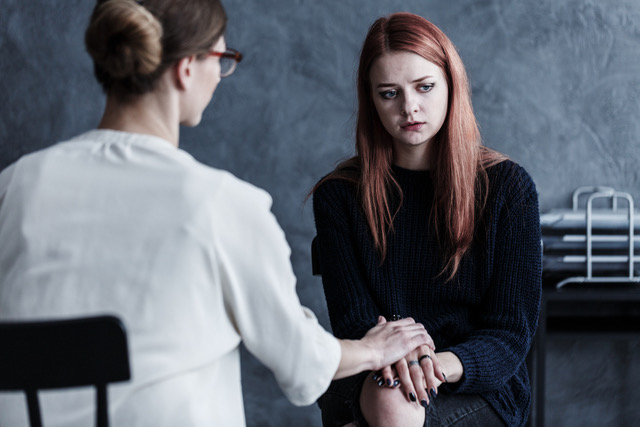
A powerful new weapon is emerging in the fight against the opioid epidemic in Florida.
It’s not a new overdose antidote, treatment therapy or zero tolerance law. It’s people who have experienced drug addiction or mental illness now trained and certified to help others recover, and it’s a game-changing movement for those on the frontlines of this deadly battle, said Dr. Christine Cauffield, CEO of LSF Health Systems, one of the state’s largest networks of behavioral healthcare providers.
“The early success we’ve seen in recent pilot programs has convinced us that certified peer recovery specialists could finally give us the upper hand against this devastating epidemic,” Cauffield said.
LSFHS has been working with Jacksonville-based Gateway Community Services and Ascension St. Vincent’s on Project Save Lives – a pilot program using certified peer recovery specialists as part of integrated emergency room teams. The tremendous success of the pilot has led to plans for expansion into other hospitals in Northeast and North Central Florida.
The Florida Legislature this month passed legislation that could greatly expand the use of certified peer recovery specialists in part by eliminating background screening barriers for peer specialist needed in hospitals and treatment centers. The bill, which is awaiting Florida Gov. Ron DeSantis’ signature, also authorizes the Florida Department of Children and Families to manage the credentialing and certification processes for peer recovery specialists.
These changes are crucial, said Danielle Rice, a certified peer recovery specialist who completed LSF Health Systems’ Certified Recovery Peer Specialist (CRPS) training program last June and now works with individuals recovering from addiction.
“If certified peer recovery specialists, clinicians, hospitals, jails, substance abuse professionals and mental health facilities all learn to work as a system, the sky is the limit for recovery programs,” Rice said. “It’s a powerhouse for mental wellness, to have support from all angles, that will raise individuals’ chances for recovery to remarkable levels.”
The certified peer recovery specialist concept dates back to the 1960s anti-psychiatry movement in the mental health field. It’s widespread use in substance abuse treatment began in the mid 2000s when the federal government called for a transformation of the existing system.
Despite extensive clinical research showing peer support specialists provide a path to lower relapse rates, decreased psychotic symptoms and reduced hospitalization rates, earlier pushes for peer recovery specialists in states like Florida faded as those trained in the field could not find employment.
“There were thousands of certified peer recovery specialists in 2007, but by 2011 the number had dropped to a couple hundred,” said Rice who first became a certified peer recovery specialist in 2008. “The problem was that you couldn’t get work if you had a felony on your record, no matter how long ago that offense was.”
Unsurprisingly, there were few people with real-life drug addiction experience who had no felony convictions. That catch-22, which doomed past peer specialist movements, has begun to change. And Stevenson’s pending legislation would be a huge step forward for certified peer recovery specialists in Florida, Cauffield said.
Another roadblock that is changing relates to the inconsistent credentialing for peer recovery specialists from state to state. A 2016 national study by the University of Texas found that 41 states have programs to certify peer recovery specialists. However, each state’s criteria vary.
To become certified in Florida requires a high school diploma, attestation of lived experience, 40 hours of training, 500 hours of supervised work or volunteer experience providing peer-to-peer recovery support services, and letters of recommendation — as well as passing the Florida Certified Recovery Peer Specialist Exam. A recent review from the federal Government Accountability Office highlights that as the demand for peer recovery specialists grows there is a need for “increased attention to standardizing the competencies of peer specialists through certification.”
To help meet this growing need, LSF won a 2016 grant from the federal Health Resources and Services Administration (HRSA) to develop a CPRS training program at Jacksonville University. The first class of 52 certified peer recovery specialists graduated last year. The course, now in its second year, provides participants with the state-required training, testing and 500 hours of experience providing peer support services. The grant provides funding to train up to 70 peer specialists a year for the next three years, which will greatly address the dearth of peer specialist in Florida.
Through the Project Save Lives pilot program, LSF’s state-certified peer recovery specialists work alongside emergency room doctors and nurses and then serve as advocates for patients as they progress through treatment programs. When overdose patients arrive in ERs, once they are stabilized, they meet with a certified peer recovery specialist who advises them through their withdrawal and recovery if they accept the assistance. The results have been impressive, said Christi Smith, MSN, RN, nurse manager of the emergency department at Ascension St. Vincent’s Riverside
“Our emergency room at Ascension St. Vincent’s Riverside was the first in the area to use certified peer recovery specialists as part of Project Save Lives,” Smith said. “They provide our nurses and physicians with a valuable new service that helps us provide compassionate, personalized care to patients who have overdosed and need treatment.”
Rice, who now teaches for LSF Health Systems’ CPRS program, said she knows better than most the value that certified peer recovery specialists offer in initial consultations and ongoing therapy for drug addicts and overdose patients.
“I know that in my case, I had no respect for the medical professionals because of my history with psychologists,” Rice said. “They were giving me homework to do, but they didn’t understand what I was going through. I’d be Baker Acted, I’d lie, and they’d send me home. Then I’d just lose it all over again.”
The conversations between addicts and certified peer recovery specialists are very different, Rice said. “They need someone who really knows what they are going through, who can relate and advocate for them,” she said. “They need someone they can call 24/7 when they can’t get in touch with a doctor or psychiatrist. That’s what the certified peer recovery specialist provides – not a friend, but an advocate.”
LSF believes its CPRS program is ready to expand to more hospitals and areas of the state in order to meet a tremendous growing demand in the mental health and substance abuse areas, Cauffield said. The training curriculum LSF developed has been approved by Florida’s Certification Board. The pilot project is expanding to Baptist, UF Shands and Flagler hospitals. And the certification program is coming to Volusia and Orange counties.
This expansion is happening thanks in large part to recent changes in attitudes among Florida’s medical and mental healthcare professions. In 2008, some physicians and psychiatrists saw peer recovery specialists as a threat or a potential interference, Rice said. That view is evolving.
“Times are starting to change, but we’re still not 100 percent understood,” she said. “A lot of clinicians still feel threatened, but an increasing number of them are now opening the door to letting peer specialists come in and do our jobs.”
That trend is why LSF Health Systems and its parent organization, Lutheran Services Florida, see the CPRS as a true game-changer in Florida’s fight against the opioid epidemic, said Sam Sipes, CEO of Lutheran Services Florida.
“We have an important destination, and we can only get there by creating innovations driven from our organization’s mission, vision and values,” Sipes said. “Expanding this program will reach more clients and help answer their prayers. That’s why it’s important.”
LSF Health Systems is a division of Lutheran Services Florida, a statewide non-profit organization transforming lives by ensuring safe children, strong families and vibrant communities since 1982. Read more about both organizations at www.lsfnet.org.
